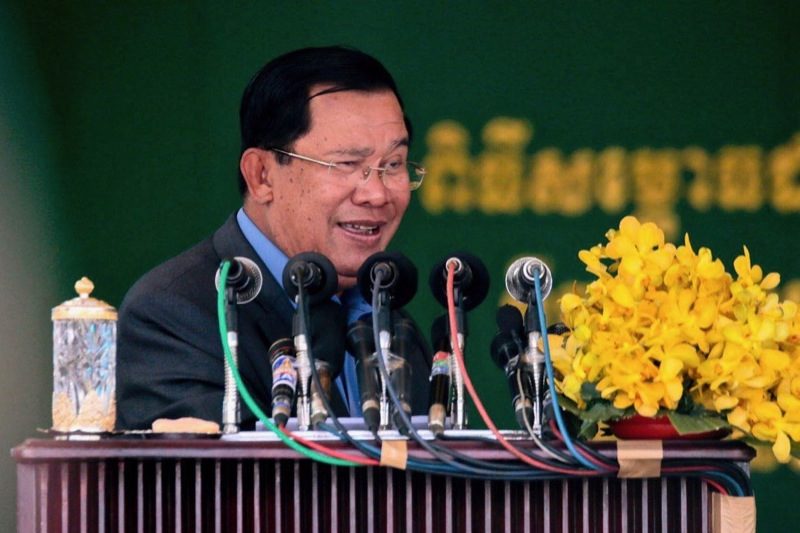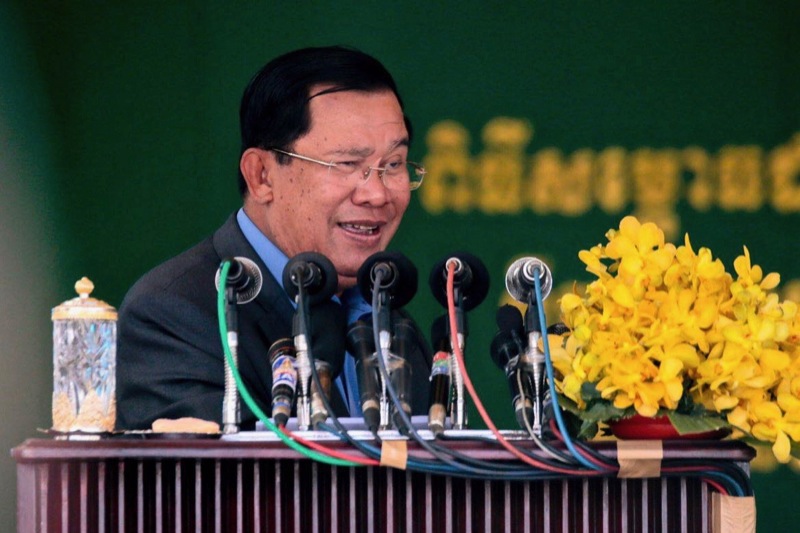With crucial local elections around the corner and a national contest set for next year, Prime Minister Hun Sen on Tuesday returned to warning Cambodians that a vote for anyone but the long-ruling CPP was a vote for plunging the country back into the bloody depths of civil war.
In the lead-up to national elections four years ago, the opposition CNRP used the promise of “change” to great effect, turning the word into a rallying cry that helped the party give Mr. Hun Sen his worst performance at the polls in 20 years and nearly handing it the election.

But at a primary school inauguration in Kompong Cham province on Tuesday, the premier said the CPP had given Cambodia all the change it needed and warned that the change offered by anyone else would lead only to ruin.
“Be very cautious about such promises, which ruin life and lead the country into chaos,” Mr. Hun Sen said, falling back on the fearsome rhetoric that has become a hallmark of his campaign talk. “Do you remember the change from Preah Norodom Sihanouk to Lon Nol, when the war erupted?”
That 1970 coup ushered in a five-year civil war that ended only with the victory of the Khmer Rouge, under whose ultra-marxist reign of terror roughly a quarter of the population perished from disease, starvation, overwork and murder.
Mr. Hun Sen did not mention that he was a foot soldier for the forces that brought the Khmer Rouge to power.
In another favorite rhetorical flourish, he threatened voters thinking of changing leaders with the chaos roiling parts of the Middle East.
“Look! Look at Libya, Syria and Iraq. What are the results so far? It’s just killing every day,” he said. “Saddam Hussein was killed, and now how many Saddam Husseins exist in Iraq? Then [Muammar] Qaddafi was killed. How many more Qaddafis emerged and how many people have been killed?
“Now [they] want to kill Hun Sen, and [they] want to topple Hun Sen. What will happen in the near future?” he asked the crowd at the school inauguration. “It’s a matter that raises a question mark—whether you all could sit peacefully in your seats like this.”
Mr. Hun Sen has built his 32-year reign as premier on the back of such talk, christening himself the country’s savior and master builder in one, holding out the promise of more roads and schools if he stays while at the same time warning of death and destruction if he doesn’t. Without fail, the rhetoric picks up with every coming election—commune elections are scheduled for June 4.
Most Cambodians are now too young to have lived through the local tragedies those fears feed on, however, and many election observers say that for many voters, the same promises of more infrastructure without genuine reform are wearing thin. They point to the opposition’s major electoral gains in 2013 as proof.
Mr. Hun Sen’s turn to the Middle East has put a contemporary, if often misleading, spin on the old narrative; he likes calling the region’s armed uprisings “color revolutions,” which they were not, and drawing parallels to the CNRP’s mass demonstrations after the 2013 poll.
Koul Panha, executive director of the non-government Committee for Free and Fair Elections, said on Tuesday that the prime minister was also conflating the armed power struggles of the past—or in other countries—with the democratic challenge he faces at home today.
“We cannot use those countries or Cambodia’s history to compare change [of leaders] because those changes were made with armed forces and rebellion to topple the government,” he said.
“So any change through the principles of a multiparty liberal democracy with free and fair elections, I don’t think that would cause war or instability.”




